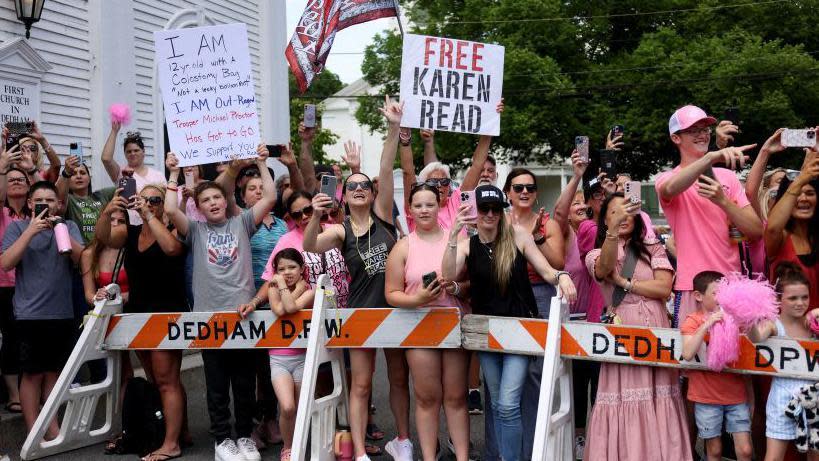Mistrial for Karen Read, US woman accused of boyfriend's murder
A judge has declared a mistrial in the case of Karen Read, a US woman charged with running over her police officer boyfriend and leaving him for dead in a snowbank.
Jurors in the murder trial, which has fascinated true-crime fans nationwide, were deadlocked after days of deliberating and could not come to an agreement on a verdict.
Ms Read, 45, had pleaded not guilty to killing John O'Keefe outside a house party after an argument in the early hours of 29 January 2022.
But defence lawyers said her 46-year-old boyfriend was killed inside the party hosted by a fellow officer, and that Ms Read was framed to conceal the crime.
Supporters of the defendant from around the country had gathered outside court wearing pink T-shirts proclaiming "Free Karen Read".
Jurors at Norfolk Superior Court deliberated for five days before they sent a note to Judge Beverly Cannone that they remained "deeply divided by fundamental differences in our opinions and state of mind" and had reached "a point where consensus is unattainable".
The judge then declared a mistrial.

A hearing on the next steps for the Ms Read is set for July 22. Prosecutors at the Norfolk District Attorney's Office say they plan to re-try the case.
Ms Read, an equity analyst and university finance lecturer, was charged with second-degree murder, manslaughter while operating under the influence of alcohol, and leaving the scene of personal injury and death.
She and O'Keefe were at two bars in the Boston suburb of Canton on the night of 28 January 2022 when she said she drove him to an after-party at the nearby home of a fellow Boston police officer, Brian Albert.
Prosecutors said the couple fought and after O'Keefe got out of his girlfriend's Lexus SUV outside the house, an allegedly intoxicated Ms Read deliberately reversed into him and drove off.
O'Keefe was left with catastrophic head injuries, incapacitated and freezing to death, said prosecutors.
People inside the house testified that O'Keefe never made it inside that night.
Prosecutors also said the defendant's car had a broken brake light and that the vehicle's internal system showed she had reversed at a rapid speed.
Ms Read said that when her boyfriend did not return home, she and two other women went out to look for him.
They found O'Keefe's body in front of the fellow police officer's home.

Firefighters who responded to the scene that morning testified that Ms Read told them: “I hit him, I hit him.”
Ms Read has said that she asked in a state of panic and shock: "Did I hit him?”
The defence argued that O'Keefe went inside the house, was killed during a fight, and that his body was brought outside and dumped in the snow.
A federal agent, Brian Higgins, was also in the house at 34 Fairview Road, and the trial heard that he and Ms Read had exchanged flirtatious texts and a physical kiss.
Conspiracy theories about the case were stoked by text messages sent by the lead investigator.
During testimony, Massachusetts State Police Trooper Michael Proctor admitted calling Ms Read a "whack job", telling colleagues he had found "no nudes" while searching her phone for evidence, and messaging his sister that he wished Ms Read would "kill herself".
He apologised on the stand for the "unprofessional" comments.

Mr Proctor also acknowledged a friendship with the brother of Brian Albert, the police officer who hosted the house party, and his wife, but insisted this personal relationship did not taint the investigation.
Defence lawyer Alan Jackson said during closing arguments: "Ladies and gentlemen, there was a cover-up in this case, plain and simple."
Prosecutor Adam Lally countered by telling jurors the defence had created a conspiracy theory in a “three-card monte”.
Ms Read and O'Keefe were in a relationship - which prosecutors said grew tumultuous - for about two years before his death.
The trial heard that after she drove away from the house, she called his phone and left a voicemail shouting: “John, I [expletive] hate you!”
Ms Read's attorneys said the couple merely had occasional arguments.
Some have compared the viral Read case to other true-crime hits involving women accused of violent crimes, such as Casey Anthony, Amanda Knox or Jodi Arias.
Adam Golub, a professor at California State University, Fullerton, who specialises in true crime, told the BBC these types of cases go viral because they have a "rabbit hole effect to them".
"They make us want to dive deep, theorise and debate, become an armchair detective," he said. "They get us to gather around the social media water coolers and talk about it. There’s an addictive quality that generates an endless stream of content for us to consume."
There is a particular niche in true crime stories, too, in women who are accused in such cases. Mr Golub said there's a heightened fascination with female suspect due, in part, to true crime stories typically being dominated by stories of men harming women.
"Femme fatale figures fascinate us because they challenge society’s expectations of how women should behave," he said. "They seem to do the unthinkable. They are viewed as powerful, but in a dangerous way."
Dr NG Berrill, a forensic psychologist and executive director of the New York Center for Neuropsychology and Forensic Behavioral Science, added a case like this can also generate more attention because people are "able to relate on some level" to the accused.
"That's why most cases go unnoticed. Street crime isn't interesting to people," he said.
"People would like to say they aren't entertained, but they are, learning about horrifying details, especially if there's a hook - sex, relationships, violence. That draws people in."
(With additional reporting by Bernd Debusmann Jr)

